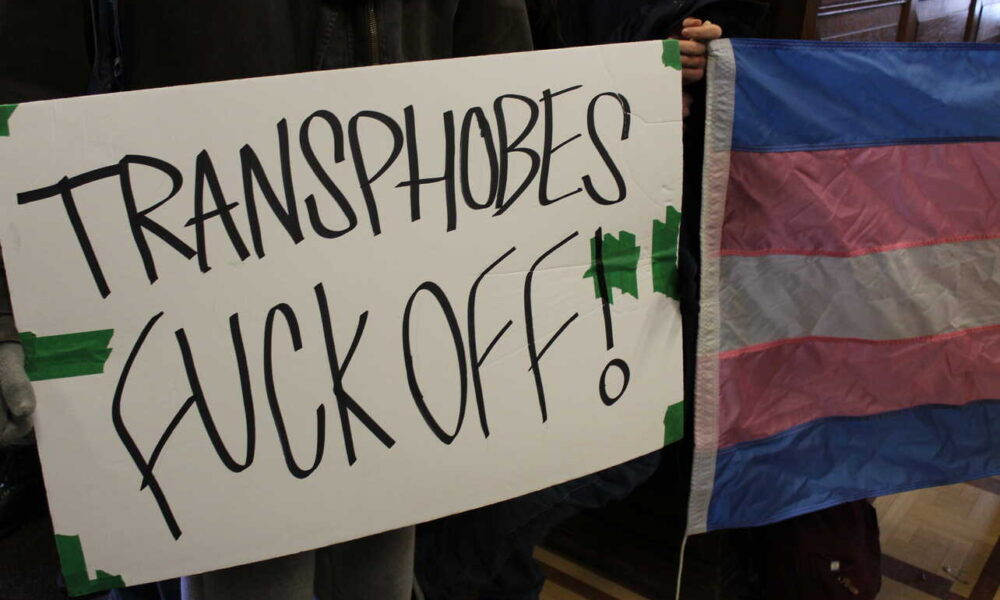Content warning: Mention of racist and transphobic violence
In the early afternoon of Jan. 10, McGill students and members of the 2SLGBTQIA+ community packed into Chancellor Day Hall to protest “The Sex vs. Gender (Identity) Debate in the United Kingdom and the Divorce of LGB from T,” a talk by Robert Wintemute hosted that day by the Faculty of Law’s Centre for Human Rights and Legal Pluralism (CHRLP).
Wintemute, a human rights lawyer and professor at King’s College London, is a trustee of the LGB Alliance, an anti-trans lobbying organization and charity in the U.K. that aims to protect the rights of lesbian, gay, and bisexual people while simultaneously recognizing sex solely as a binary.
Trans activist Celeste Trianon, along with members of Trans Patient Union and RadLaw McGill—all of whom organized the protest—filed through the entrance of Chancellor Day Hall 20 minutes before the talk was slated to begin, carrying bullhorns and banners, chanting “LGB with a T.” Students and 2SLGBTQIA+ community members gathered around the organizers to show solidarity and joined in the chanting, quieting only to let Trianon speak.
“McGill’s Faculty of Law, by actively giving a platform to anti-trans lawyer Robert Wintemute, is directly contributing to the same rollback of human rights that have been plaguing our world as of late,” Trianon said in their opening remarks. “The sheer irony in platforming him through the [CHRLP] cannot be overstated. Trans rights cannot, can never be, separated from gay or lesbian rights and they are not at odds with the rights of children or women.”
As Trianon continued, protesters cheered and jeered, interjecting by calling “shame” on the CHRLP, Robert Leckey—the Dean of the Faculty of Law—and McGill. By 1 p.m., protestors were blocking the doors to the room where Wintemute was supposed to give his talk with banners, and 20 minutes later, protest organizers announced that the talk was cancelled. Wintemute and Leckey were still inside.
Some trans activists in attendance, including Bee Bergeron, U1 Arts, were disappointed that they had to spend a Tuesday afternoon fighting for their rights rather than attending class.
“I thought university would be a welcoming space for me. I thought I would be able to just focus on my studies without worrying about [my rights],” Bergeron said in an interview with The McGill Tribune. “Ta yeule, TERF [shut up, TERF].”
Bergeron added that Wintemute should “stop trying to insert [himself] in university affairs, stop trying to legitimize bullshit. It is so unfair to trans people, especially trans women of colour because they kickstarted the whole movement and now [he is] backstabbing them.”
Trans women of colour such as Marsha P. Johnson, Sylvia Rivera, and Miss Major Griffin-Gracy, were prominent figures in the gay rights movement in the United States during the 1960s and 1970s, and were some of the strongest voices at key events like the Stonewall uprising. Despite the crucial role trans women of colour have played in securing LGBTQ+ rights, 57 trans women and non-binary folks of colour were killed in the United States in 2021 alone.
After Wintemute’s talk was cancelled, protestors took up the chants “no TERFs on our turf” and “TERFs go home.” They directed calls at supporters of Wintemute who stood outside the event space—one woman was seen sporting an “I love JK” t-shirt, referring to Harry Potter author J.K. Rowling who has repeatedly made transphobic comments on Twitter.
Police were also on the scene. Two officers entered Chancellor Day Hall as the protest reached its peak to ensure no violence broke out. The officers did not stay for more than a few minutes, after which they remained in their patrol car outside. They were not present when protestors threw baking flour at Wintemute.
In an interview with the Tribune after their speech, Trianon denounced McGill and the CHRLP for justifying their decision to host Wintemute with arguments about preserving and pursuing academic freedom.
“Academic freedom, like freedom of speech, is not hate speech. There is a difference between pure attacks on people’s dignity and academic freedom as we know it,” Trianon said. “This is an event designed specifically to attack the trans community, there is no other way to put it [….] When you tolerate intolerance, your ability to tolerate gets stripped away, so why should we tolerate intolerance to trans people?”
The protest received support from organizations like the Concordia Student Union, Social Work Student Association (McGill), Sex and Self, Black Students’ Network McGill, Project 10, Midnight Kitchen, and many more. More than 500 individuals have also signed an open letter penned by Trianon, RadLaw McGill, and Queer McGill criticizing McGill and demanding accountability for hosting the talk.
In the days following the protest, Dean Leckey sent an email to law students claiming their actions on Tuesday “far exceeded the generous ambit of peaceful protest.” He asked students to reflect on the consequences of their behaviour and the kind of environment created for future “guests.”
The “Sex vs. Gender (Identity) Debate” was not the first time Leckey has worked with Wintemute. In September 2013, the Montreal Gazette published a piece co-authored by the two titled, “Quebec should be as tolerant of religious diversity as it has been of sexual orientation.” Wintemute is also a McGill graduate—he earned a law degree from McGill in 1982.
The Students’ Society of McGill University (SSMU) addressed the undergraduate student body, and trans students in particular, on Jan. 12 in an email that denounced the CHRLP for welcoming Wintemute. Val Masny, SSMU vice-president External Affairs, reiterated SSMU’s statement in an email to the Tribune, adding that students should contact them to discuss action against transphobia at McGill.
“It’s important for me to emphasize all the work that was done by Queer McGill, the Trans Patient Union, RadLaw, as well as other groups, and students around this issue,” Masny wrote. “In a couple of days, I’ve seen a community come together and demand better from their university. The struggle is not over. The trans community at McGill has been asking the university for better services for years, and now they are also asking for accountability.”
On Jan. 16, Queer McGill published a letter signed by the organizers of the Jan. 10 protest detailing demands they have for the CHRLP, McGill, and the Faculty of Law. The four demands are offer an official, public apology for welcoming Wintemute, host a community consultation with an audience that reflects the trans community at McGill, investigate why Wintemute was approved to speak at the university, and make donations to the Trans ID Legal Clinic. The letter concludes by warning McGill, the CHRLP, and the Faculty of Law that if a response is not received by Jan. 26, the signatories will mobilize till the demands are met.
The day Wintemute was scheduled to speak at McGill, the LGB Alliance filed an official complaint with the United Nations against Victor Madrigal-Borloz, the current UN independent expert on sexual orientation and gender identity. The complaint alleges that Madrigal-Borloz is in violation of his mandate because he supports legislation that requires the implementation of gender self-ID practices.
Students who wish to change their gender marker on Minerva can visit the Legal Information Clinic at McGill. Those wishing to report instances of discrimination can contact the SSMU University Affairs executive team or the PGSS University Affair Officer. Trans and non-binary students seeking support should contact Project 10, Queer McGill, or the Trans Patient Union.
A previous version of this article stated that Queer McGill organized the protest. In fact, RadLaw McGill and the Trans Patient Union organized the protest, and Queer McGill only helped advertise it. The Tribune regrets this error.










Pingback: Legislative Council passes motions on Uyghur rights, support for trans students - The McGill Tribune
Pingback: SSMU BoD debates motions about campus safety app and trans students’ rights on campus - The McGill Tribune